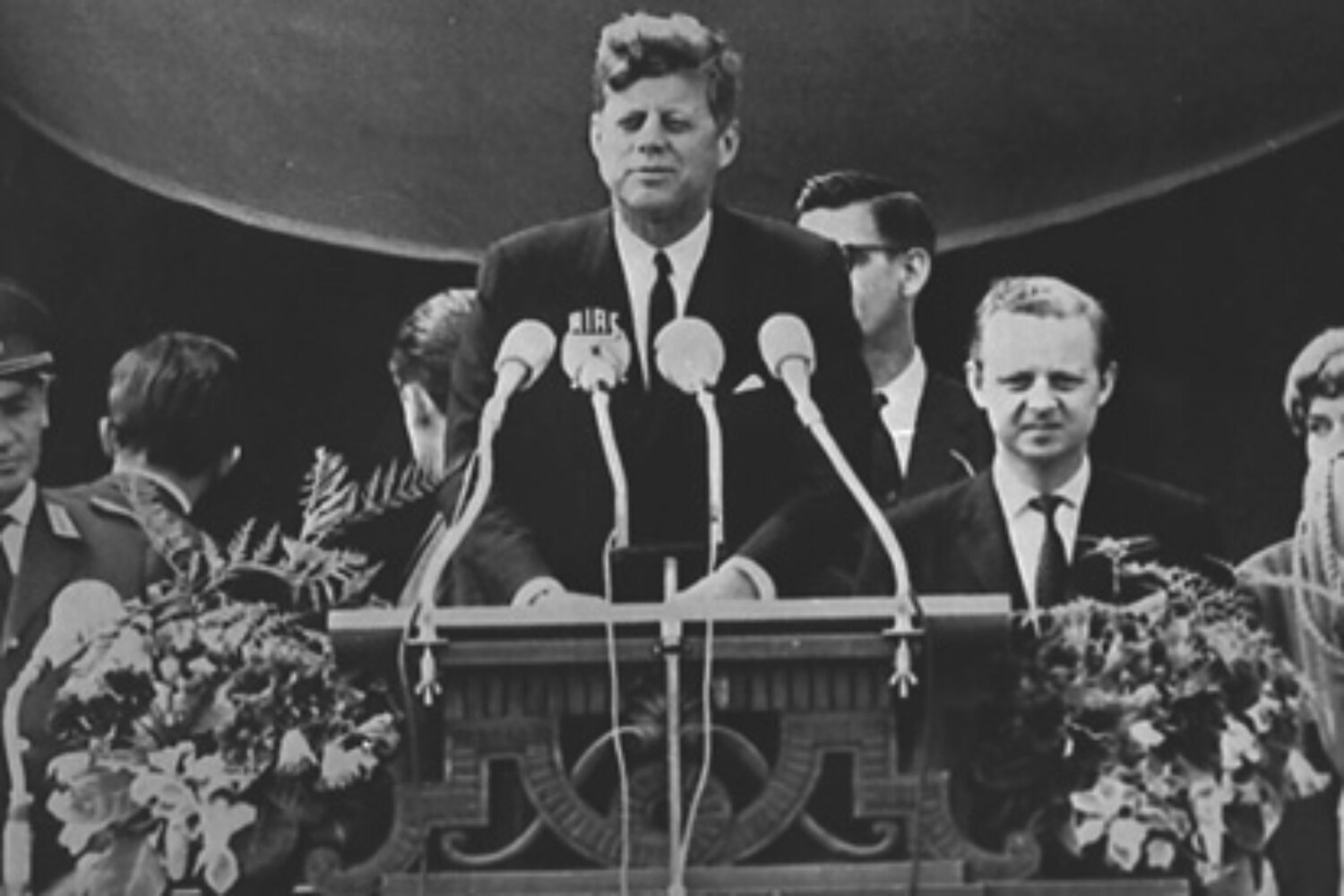
On June 26, 1963, U.S. President John F. Kennedy gave his famous “Ich bin ein Berliner” speech in West Berlin. In this speech JFK was underlining the support of the United States for West Germany 22 months after the Soviet-supported East Germany erected the Berlin Wall as a barrier to prevent movement between East and West. The message was aimed as much at the Soviets as it was at Berliners, and was a clear statement of U.S. policy in the wake of the construction of the Berlin Wall. Another notable (and defiant) phrase in the speech was also spoken in German, “Lass’ sie nach Berlin kommen” (“Let them come to Berlin”)–addressed at those who claimed “we can work with the Communists”, a remark which Nikita Khrushchev scoffed at only days later.
The speech is considered one of Kennedy’s best, both a notable moment of the Cold War and a high point of the New Frontier. It was a great morale boost for West Berliners, who lived in an exclave deep inside East Germany and feared a possible East German occupation. — Source: Wikipedia
I am proud to come to this city as the guest of your distinguished Mayor, who has symbolized throughout the world the fighting spirit of West Berlin. And I am proud to visit the Federal Republic with your distinguished Chancellor who for so many years has committed Germany to democracy and freedom and progress, and to come here in the company of my fellow American, General Clay, who has been in this city during its great moments of crisis and will come again if ever needed.
From the start JFK builds a bridge of sympathy to his German audience. He calls himself a “guest”, he sets his two main hosts apart by calling them “distinguished”, and he mentions a personified symbol of trust – General Clay. One symbolic person weighs more than an intangible nation.
Two thousand years ago, two thousand years ago, the proudest boast was “civis Romanus sum.” Today, in the world of freedom, the proudest boast is “Ich bin ein Berliner.”
These 29 words are a rhetorical masterpiece. By equating his slogan “Ich bin ein Berliner” with the Roman Empire JFK adds historical weight to the phrase. He also uses repetition/anaphora and parallelism to emphasize his words. Finally, the metaphor “world of freedom” is a subtle outcry: We are free, you are not!
I appreciate my interpreter translating my German.
There are many people in the world who really don’t understand, or say they don’t, what is the great issue between the free world and the Communist world.
Let them come to Berlin.
Simplification is the ultimate sophistication, said Da Vinci. Why explain complex differences between political systems? Come to Berlin and see for yourself. JFK continues to build a strong bond with his audience by saying “Let them…” We are here in Berlin. We know all about it. Let the others come to us. He repeats the phrase five times at the end of the paragraphs, which is a rhetorical device called epistrophe, the reversed form of an anaphora. By using epistrophe – once even in German which creates even more sympathy – the President does what Barack Obama did years later with his “Yes, we can.” He makes it memorable.
There are some who say that communism is the wave of the future.
Let them come to Berlin.
And there are some who say, in Europe and elsewhere, we can work with the Communists.
Let them come to Berlin.
And there are even a few who say that it is true that communism is an evil system, but it permits us to make economic progress.
Lass’ sie nach Berlin kommen. Let them come to Berlin.
Freedom has many difficulties and democracy is not perfect.
Great one! JFK openly addresses weaknesses. We are not perfect is a fantastic message because it makes it more difficult for the opponents to attack.
But we have never had to put a wall up to keep our people in to prevent them from leaving us.
The wall makes his point tangible.
I want to say on behalf of my countrymen who live many miles away on the other side of the Atlantic, who are far distant from you, that they take the greatest pride, that they have been able to share with you, even from a distance, the story of the last 18 years. I know of no town, no city, that has been besieged for 18 years that still lives with the vitality and the force, and the hope, and the determination of the city of West Berlin.
After JFK made his point clear about who is right and who is wrong, he flatters his audience. Remarkable is his use of polysyndeton at the end of the paragraph.
While the wall is the most obvious and vivid demonstration of the failures of the Communist system for all the world to see we take no satisfaction in it; for it is, as your Mayor has said, an offense not only against history but an offense against humanity, separating families, dividing husbands and wives and brothers and sisters, and dividing a people who wish to be joined together.
According to Aristotle, no persuasion, no moving to action of people without the three pillars of rhetoric. By addressing the separation of families, JFK adds pathos to his speech, an emotional appeal to the audience.
What is true of this city is true of Germany: Real, lasting peace in Europe can never be assured as long as one German out of four is denied the elementary right of free men, and that is to make a free choice. In 18 years of peace and good faith, this generation of Germans has earned the right to be free, including the right to unite their families and their nation in lasting peace, with good will to all people.
3 x peace, 3 x free, 2 x good, 2 x true, 2 x right – JFK insists on his cause. Excellent choice of words, repetition throughout the entire paragraph, and a chiasmus make this paragraph another rhetorical highlight.
You live in a defended island of freedom, but your life is part of the main. So let me ask you, as I close, to lift your eyes beyond the dangers of today, to the hopes of tomorrow, beyond the freedom merely of this city of Berlin, or your country of Germany, to the advance of freedom everywhere, beyond the wall to the day of peace with justice, beyond yourselves and ourselves to all mankind.
In this paragraph, opened by a great metaphor, JFK appeals to the greater good just like Lincoln did in his famous Gettysburg Address. This is not about Berlin. This is not about Germany. This is about all mankind.
Freedom is indivisible, and when one man is enslaved, all are not free. When all are free, then we can look forward to that day when this city will be joined as one and this country and this great Continent of Europe in a peaceful and hopeful globe. When that day finally comes, as it will, the people of West Berlin can take sober satisfaction in the fact that they were in the front lines for almost two decades.
Powerful ethos! JFK is the spokesman of a nation that suffered from slavery itself. Therefore, he knows what he’s talking about when he talks about slavery and freedom. Then, he does what all great speeches have – he illustrates a vision of the future. I love JFK’s conviction compressed in three words – “as it will”. What also sticks out is his oxymoron – “sober satisfaction” – and his switch from 18 years to “almost two decades”. The latter sounds longer.
All free men, wherever they may live, are citizens of Berlin.
And, therefore, as a free man, I take pride in the words “Ich bin ein Berliner.”
Brilliant finale making Berlin the symbol of freedom in the world. He ends with his famous phrase and he doesn’t say thank you. Thank you, JFK!


Vladimir
NICE
Hank
A truly remarkable speech indeed. When I look back at this time I really remember the feeling I had listening to his words of love indiced with freedom, OUF, getting goosebumps just thinking about it. Hope you or your elders also had the opportunity to listen to this mans revolting sound. Hope you have a great time vladimir, see you soon 🙂
Kind regards
Unkle Hank
Cornelia Manshatare
Yeah dog!
angelelilianhanna
very good we nailed our class presentation YYAAAA THANK YOU JFK
gros poutous de la france